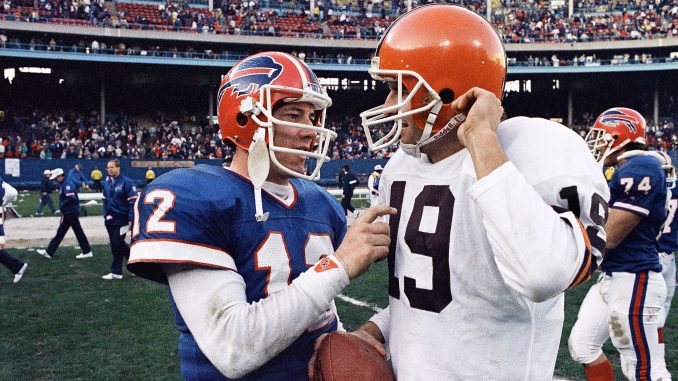
The coronavirus pandemic is forcing the cancellation of games in all major sports that are in season and threatening to cancel games for the foreseeable future.
While we can’t do anything to stop COVID-19 or bring back the sports we love, we can go back in time and get back some of the games we’ve called off due to labor unrest.
In an ongoing series, while none of us have any live sports to watch, we’re un-canceling canceled games from history. We’re not using computer or video game simulations or statistical tricks. Instead, we’re using actual action that took place on the field or ice. Basically, for each canceled game, we’ll use the next time those two teams played (at the same venue) as a “makeup game.” For example, we would use games from the 2020-21 NBA and NHL seasons to fill in any holes left by the coronavirus in this year’s schedule.
This week, we’ll look at the 1987 NFL strike.
Like the 1982 season we rebuilt last week, this was a mid-season strike. The players walked out following Week 2 and came back for Week 7.
The league took a controversial approach to the dispute. After calling off the Week 3 games, NFL owners hired teams of replacement players who took the field for the following three weeks. When the original players returned, the decision was made that the replacement games would count in the league standings, and playoff berths were determined by the 15 weeks that had been played.
The Redskins went on to beat the Broncos in the Super Bowl, their second championship in a strike-altered season.
We started the un-canceling process by merely making up the canceled games in Week 3. As one might expect, this had a relatively minor impact on the NFL playoff picture for the season. The extra game caused one wild card spot to flip. The Steelers ended up taking the final spot in the AFC playoffs from the Seahawks.
Both teams (Seattle in real life and Pittsburgh in the makeup games) ended up losing to fellow AFC wild card Houston in the first postseason game, so the rest of the playoffs had no changes.
No one was happy about the replacement games being played or counting in the standings, however. So next, we replayed those with real NFL players in makeup games. That shook things up a little more.
Of the 42 replacement games that were played, 24 had different results when we played the makeup game. Replaying the canceled and replacement games, here’s the impact of replacing the four strike-tainted weeks of the 1987 season.
AFC
Indianapolis won the AFC East in real life. The Colts picked up two additional losses in the makeups, however, and dropped to .500 and out of the playoffs. Buffalo, meanwhile, won its canceled game and flipped two of its replacement game losses to wins to go from fourth place to the division title.
In the Central, the Browns extended their division lead, taking the crown with an 11-5 mark. Houston held onto its wild card berth, and Pittsburgh picked up an extra win to nose out Seattle for the other wild card.
In the West, Denver lost the makeup of its canceled game and had a replacement win flip to a loss. The Broncos, however, still held onto the division title. Second-place Seattle also lost a replacement win and dropped the makeup game for the canceled week to not only miss a chance to take the division but fall out of the playoffs entirely.
NFC
The Redskins held onto the East Division crown. Philadelphia flipped two replacement losses to wins to boost the Eagles into second, but it wasn’t enough to get a wild card.
In the Central, the Bears added an extra win to hold onto the division title. Minnesota flipped a pair of replacement losses to wins to finish second with a 10-6 mark, good enough to hold onto its wild card.
Out West, San Francisco added a win to take the division at 14-2. New Orleans held onto the wild card with a 12-4 mark.

Playoffs
As we explained last week, we made up the postseason games in chronological order. In other words, a playoff game couldn’t be played until both teams involved had finished making up their regular seasons and any previous rounds of the playoffs.
Obviously, this took a while. The NFC Championship Game wasn’t made up until 2009, and the Super Bowl was played in 2012.
Houston beat Pittsburgh, 23-3, in the AFC wild card game and traveled to Cleveland where they lost to the Browns, 34-10. Buffalo continued its Cinderella run in the divisional round, beating Denver, 27-20. The former fourth-place Bills then upset Cleveland in the AFC Championship Game, 22-19, to advance to its “first ever” Super Bowl. Can the Bills get their elusive Super Bowl win three years before Scott Norwood’s miss?
In the NFC, the Saints beat the Vikings, 28-15, in the wild card but lost the following week in San Francisco in a barn burner, 28-27.
The Bears dethroned the real-life Super Bowl champions in the divisional round, beating the Skins 27-24.
The 49ers then beat Chicago in a low-scoring NFC Championship Game, 10-6, to give us the 49ers-Bills Super Bowl that seemed to be predicted every year in the late 1980s and early 1990s but never came to pass.
Dig up all those old Buffalo BiLLLLs jokes, because it happened again. In a laugher of a Super Bowl, the Niners posted a 45-3 win over hapless Buffalo. Which just goes to show: You can make up games, but you can’t change destiny.



